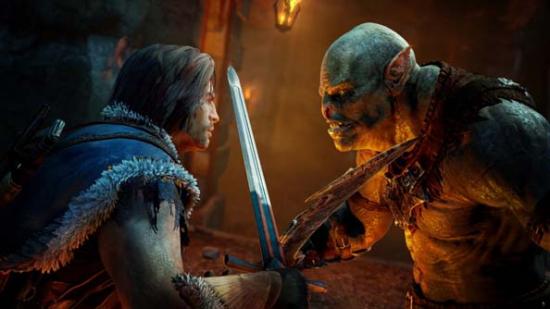Life in Shadow of Mordor goes on without you.
Most open world games only seem to have life when you’re looking, GTA’s cars only spawn into existence when you get close enough, Assassin’s Creeds’ pickpockets never spend the money they steal because they exist only as long as you can see them, and Skyrim’s denizens only complain about their arrow wounds when you’re within earshot.
Shadow of Mordor is different.
It has a world of characters that have ambitions, relationships, and enemies all of their own. Goals that have nothing to do with you that play out separate to you.
You get to see it all in play when you die.
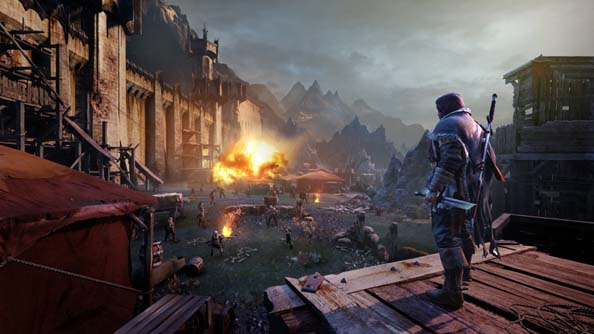
Shadow of Mordor is a little like Assassin’s Creed by way of Tolkien. Though, instead of renaissance Venice, you’re given all of Mordor to explore, with all its ancient cities, deadly fortresses, and uninviting caves to boot. Plus, you don’t play as a wuss from the future sent back in time by a plot device, you play an eats-danger-for-breakfast ranger by the name of Talion who ends up on the wrong side of an uruk blade. Rather than die, as would be traditional, Talion’s spirit binds with that of an ancient wraith, Celebrimbor. Your union not only brings you back from the dead but leaves you imprinted with some pretty potent abilities.
One nifty move is the shadow strike: Talion launches a wraith arrow at a foe and immediately teleports to the target, stabbing his sword Urfael into the victim. It’s great in a fight but also a quick means of getting about the battlefield. In comes in handy when scaling a fortress’ walls, too. Shadow striking a guard patrolling the ramparts saves you climbing up the two story-high walls.
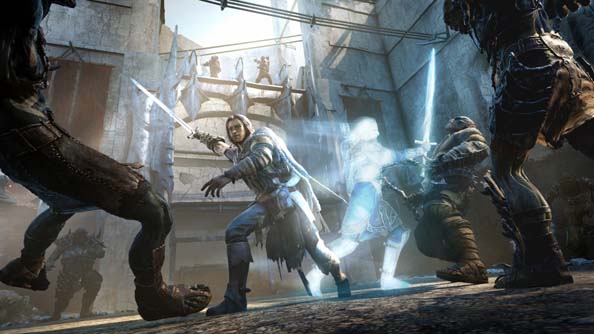
Celebrimbor also lets you dominate the minds of Mordor’s creatures. In the demo I was shown, Talion climbed up the back of a graug, a vast brainless creature which looks a little like a hairless King Kong, and dominated its mind. He then rode it across the open plains of Mordor and attacked an uruk war band, even when he slipped from the creature’s back it continued fighting for him, splitting the enemies’ attention. You can dominate the uruks, too, evening the odds in a scuffle.
If Shadow of Mordor were simply this, an open world action game where you infiltrate fortresses and cut uruks to pieces with your sword and wraith abilities, it’d be a lot of fun. That side of the game looks like it could suck me in for hours. However, there’s a whole political layer on top that I find far more compelling.
Mordor’s fortresses divide the region into different territories, each ruled by a different war chief. They each command captains who, in turn, command platoons of grunts. They all want you dead but they may want their neighbour dead more.

These captains and war chiefs are unique to your game: when you first start Shadow of Mordor the game generates a batch of captains and war chiefs, gives them names, an individual look, and different attributes. It also assigns them loyalties, rivalries and goals. Some of the war chiefs will be bitter rivals, some of the captains will act as bodyguards for the war chiefs, and others will be leading their own war band, unaffiliated with a war chief.
All the while you’re playing they are acting out their own drama. A war chief will be assassinated by one of his more ambitious captains; a captain on the hunt will be killed by a wild animal and replaced by one of his grunts; two factions will go to war with each other. They’ll level up and gain in strength the longer they survive in the world and the more duels they win.
Every uruk grunt has the potential to become a captain and any of them can be killed. This means the political landscape is constantly changing as uruks rise and fall.
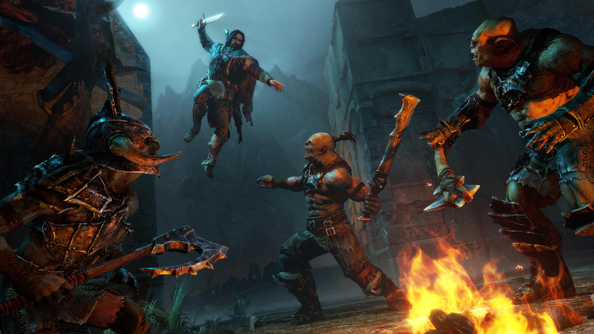
As uruks rise up the political food chain they become more powerful, both in terms of physical attributes and abilities. They will become stronger fighters that do more damage and have more health, yes, but they will also gain buffs that affect all their troops. Often these buffs will counter your abilities. For instance, you’ve a crowd control power that stuns groups of enemies but there’s a buff that not only negates the stun effect but enrages those hit, making them momentarily stronger.
However, the higher an uruk’s level (up to a maximum of 20) the more greatly you’re rewarded when you finally kill them. The strongest of them drop runes when they die – these are used to upgrade your gear and abilities. Occasionally war chiefs drop epic runes which give even stronger buffs. These are rare but you can stack the odds in your favour of them dropping by making a death threat.
Celebrimbor’s dominate ability isn’t just for capturing mounts or forcing an enemy to fight for you, you can use it to directly manipulate the politics of Mordor. Say you find a mid-tier captain on a hunt and, instead of killing him, dominate him then you can give him an order. You can have him issue a death threat to an uruk higher up on the chain. In response, if that uruk feels threatened, they will gather their captains about them and begin carrying their runes with them. Getting to that uruk is made much harder by the presence of the captains but the reward is much greater.
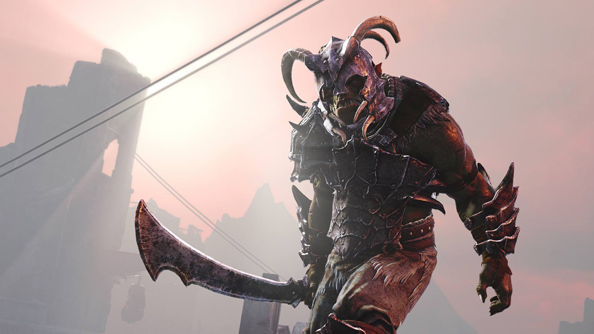
Conversely, if you wanted to make offing a war chief easier, you could dominate each of his supporting captains and send them off on missions that mean their chief is left to defend themselves.
If you kill one of these powerful uruks then it creates a power vacuum that their underlings will fight to fill. Killing a war chief sets off a cascade of duels and promotions, seeing a captain rise to take his place and a lowly grunt will become a captain to fill the void created at the bottom of the food chain.
This is most obvious when you die.
Most games handle death like time travel, sending you back to an earlier save, resetting the world to a point before you were riddled with arrows. In Shadows of Mordor time goes forwards when you die. Months pass as Celebrimbor brings your body back from the dead and you see the world change as this happens: you’re shown a screen of all the captains in the region and you watch as they interact with each other, you see their promotions, deaths, and replacements in rapid sequence.
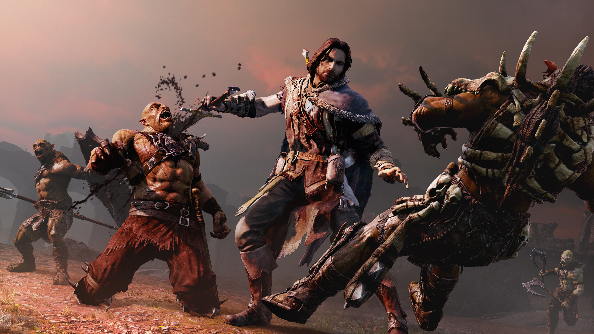
The longer you play Shadow of Mordor the more invested you’ll become in the world it creates. There will be grunts who became captains because they cut you down when you were wounded. There will be captains who become war chiefs because you killed their master. There will be uruks who become stronger because they beat you in a duel, making them harder to fight the next time you meet. The longer the Shadows of Mordor the more it is shaped by what you do.
This nemesis system is a brilliant idea and I can’t wait to see just how deep it goes, whether I’ll see full scale wars being fought between rivals where I’m just a bystander or whether all this political intrigue is handled off camera.
Shadow of Mordor is due out next month and I can’t wait to go toe to toe with my own set of uruks.
